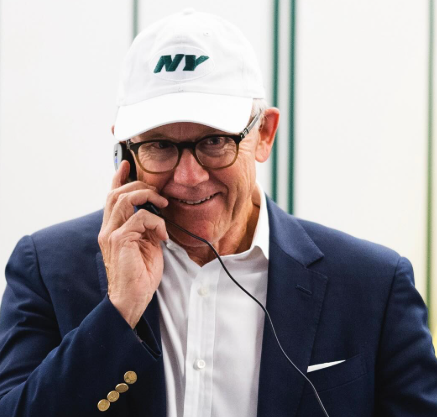The New York Jets have reached a critical juncture, where the team’s success depends on its ability to address deep-seated issues within the franchise
From ownership interference to a lack of consistency in leadership, the Jets are grappling with problems that extend beyond the field.
For fans, players, and even coaching staff, there is a growing sense that the franchise needs a reset, one that begins with ownership allowing the experts to manage the team.
The Jets will have to work to regain the trust of their fans and the respect of the NFL community. Without fundamental changes, the franchise may continue to flounder in mediocrity.
Whether Woody Johnson is willing to embrace these changes remains to be seen, but it’s clear that the Jets’ path to success lies in a commitment to stability, strategic thinking, and respect for the expertise of its football professionals.

Also Read: Barcelona Transfer Roundup: Kounde to Liverpool and Messi’s Influence on Fati
Table of Contents
Woody Johnson: The New York Jets’ Struggles Reach New Lows
Ownership Intervention and Poor Management Plague Franchise
The New York Jets’ latest chapter in NFL history has been marked by a combination of high expectations, low performance, and ownership decisions that continue to frustrate fans.
After a dismal 3-8 start to the season and the recent firing of General Manager Joe Douglas, the franchise’s leadership has been under intense scrutiny.
New revelations, however, highlight the extent to which Jets owner Woody Johnson may have influenced some of the team’s most significant decisions this season, including the handling of superstar quarterback Aaron Rodgers.
5 straight seasons with 5+ sacks for @QuinnenWilliams #NYJ pic.twitter.com/u58Ui9QPMY
— Woody Johnson (@woodyjohnson4) November 19, 2024
The Turbulent Season: Hopes Dashed Early
The Jets entered this season with hopes that Aaron Rodgers would revive their offense and finally lead the team to playoff contention.
The acquisition of Rodgers had been a highly anticipated move, with the veteran quarterback bringing both experience and excitement to the franchise.
However, a series of poor performances early on led to mounting frustrations, and Johnson’s involvement only exacerbated the team’s troubles.
According to reporting by The Athletic’s Zack Blatt and NFL insider Dianna Russini, Johnson reportedly wanted Rodgers benched just five games into the season—a move that left fans and NFL insiders alike stunned.
Ownership Intervention: Woody Johnson’s Involvement in Team Decisions
The Jets’ struggles on the field have been compounded by meddling from the top. Johnson’s hands-on approach has become a point of contention, as his apparent lack of football knowledge may be leading to misguided decisions.
Johnson’s reported desire to bench Rodgers shows a lack of trust in his front office’s initial vision, a vision that led the team to acquire Rodgers in the first place.
This intervention has contributed to what has become a season of turmoil and mismanagement, further demoralizing players and fans.

Woody Johnson’s Involvement with the Jets
A Year of Meddling That Backfired
In 2024, New York Jets owner Woody Johnson made headlines for all the wrong reasons.
Rather than staying behind the scenes, as many owners typically do, Johnson inserted himself into multiple aspects of the team’s operations.
His actions, which ranged from coaching decisions to player transactions, have been criticized by fans and experts alike.
What was meant to improve the team may have instead contributed to its failures, undermining the leadership of general manager Joe Douglas and head coach Robert Saleh, and leading to several missteps throughout the season.

The Aaron Rodgers Bench Suggestion and Coaching Shakeups
- One of the most notable instances of Johnson’s meddling occurred early in the season. After the Jets’ struggles continued, Johnson suggested that head coach Robert Saleh bench veteran quarterback Aaron Rodgers.
- Rodgers, who had been brought in with high expectations and considerable fanfare, was far from the problem on offense, yet Johnson’s suggestion to bench him raised eyebrows.
- This direct involvement in coaching decisions was highly unusual, and it set the tone for the owner’s increasingly hands-on approach to the team’s operations in 2024.
- The coaching meddling did not stop with Rodgers. In another controversial move, Johnson reportedly decided to fire head coach Robert Saleh without consulting with Joe Douglas, the team’s general manager.
- This unilateral decision further strained the relationship between the team’s management and ownership, all but sealing Douglas’ fate.
- The lack of communication and collaboration between Johnson, Saleh, and Douglas created a toxic atmosphere that made it difficult for the team to perform cohesively on and off the field.
- Johnson’s interference didn’t end there, as he also made moves to change the front office structure. When Chad Alexander left for the Los Angeles Chargers, Johnson prevented Douglas from hiring a replacement, leaving the team in a state of disarray.
- Furthermore, Johnson reportedly forced Douglas to fire his assistant, Rex Hogan, who was also a close friend of the general manager.
- This decision led to some tense moments behind closed doors, with Douglas allegedly telling his staff, “Woody should just fire me now.” These actions demonstrated an alarming disregard for the autonomy of his football operations staff, which ultimately set the stage for further dysfunction.

Woody Johnson: Player Transactions
More Interference and Poor Decisions
Perhaps one of the most damaging ways in which Woody Johnson’s meddling impacted the Jets was through player transactions.
At a time when the team needed to make bold moves to compete, Johnson’s direct influence on trades and signings caused more harm than good.
One of the first major moves Johnson vetoed was a proposed trade with the Denver Broncos that would have sent wide receiver Allen Lazard and a Day 2 draft pick in exchange for Jerry Jeudy. Jeudy, one of the more promising young receivers in the league, would have been a significant upgrade for the Jets’ receiving corps.
However, Johnson blocked the deal, preventing Douglas from improving the team’s offensive options. Instead, Jeudy was traded to the Cleveland Browns for two Day 3 draft picks and a three-year contract extension, a deal that did not bring the Jets closer to their ultimate goals.
Neglecting Key Extensions
In addition to blocking key trades, Johnson also pushed for certain signings that ultimately backfired. One such signing was that of wide receiver Mike Williams. Williams, who was expected to provide a spark in the Jets’ offense, underperformed throughout the season, failing to live up to expectations.
In the end, the Jets traded Williams to the Pittsburgh Steelers, a move that was seen as a failure given the hype surrounding his arrival.
Another signing that did not work out as planned was the acquisition of offensive tackle Tyron Smith. Smith, once one of the league’s premier offensive linemen, struggled with injuries throughout the season and was unable to perform at a high level.
His struggles on the field only added to the Jets’ offensive woes and underscored the fact that Johnson’s involvement in personnel decisions was not yielding positive results.

Woody Johnson: Missed Opportunities
While Johnson was busy meddling with player transactions and coaching decisions, he also made questionable choices regarding players who could have bolstered the Jets’ roster.
Notably, Johnson refused to extend the contracts of pass-rushers Bryce Huff and Haason Reddick. Huff, who had been a consistent contributor on the defensive line, eventually left for the Philadelphia Eagles, where he continued to thrive.
Reddick, acquired in a trade, staged a lengthy holdout over his contract situation, a distraction that lingered throughout the season.
The failure to extend these key defensive players hurt the Jets, who had been relying on their defense to keep them competitive while the offense struggled.
The lack of attention to these contract extensions highlighted the inconsistency in Johnson’s approach, as he focused on high-profile signings and transactions while neglecting key areas of the roster that could have made a difference.
The Tony Adams Bench Decision
Perhaps one of the most bizarre and controversial decisions made by Woody Johnson was his decision to bench safety Tony Adams. Adams had been performing well, emerging as one of the more productive and impactful tacklers among defensive backs.
His development into a promising player was seen as a bright spot for the Jets’ defense, but Johnson, against the wishes of the coaching staff, announced that Adams would be benched.
This decision baffled many, as it undermined the progress the team had made on defense and directly contradicted the staff’s assessment of Adams’ abilities.
Johnson’s push to bench a player who had been performing well was seen as an unnecessary disruption, one that only further strained the relationship between the owner, the coaches, and the players. It was yet another example of how Johnson’s interference in football decisions had a detrimental effect on the team’s overall performance.

Woody Johnson: The Davante Adams Trade
In one of his most high-profile and widely discussed moves, Woody Johnson pushed for a trade that would have brought wide receiver Davante Adams to the Jets.
Adams, a superstar receiver, was seen as a potential game-changer for the Jets’ offense, which had been struggling throughout the season. Johnson believed that Adams would provide the missing piece to solve the team’s offensive woes.
However, the trade ultimately did not materialize, and Adams remained with the Las Vegas Raiders for the season.
Had the trade gone through, it could have shifted the balance of power in the AFC, but it was another instance where Johnson’s meddling interfered with the team’s decision-making process.
The trade, which was hyped up for much of the season, never came to fruition, leaving fans and analysts wondering if Johnson’s impatience had played a role in the failure of the deal.
View this post on Instagram
The Fallout: Dysfunction and Accountability
- As the 2024 season continued, it became increasingly clear that Woody Johnson’s hands-on approach was backfiring.
- The Jets found themselves mired in dysfunction, with management unable to make cohesive decisions on coaching, player transactions, and roster moves.
- This dysfunction affected the team’s on-field performance, and by the end of the season, the Jets were far from the playoff contenders they had hoped to be.
- Johnson’s meddling not only created rifts within the team but also led to questions about his ability to manage the franchise effectively.
- As the season came to a close, the Jets faced the inevitable consequences of Johnson’s interference: a coaching staff in turmoil, key players leaving or underperforming, and an overall sense of disarray that permeated the organization.
- The 2024 season will likely go down as a cautionary tale of an owner who overstepped his bounds, failed to trust his football operations staff, and ultimately contributed to the Jets’ inability to capitalize on their potential.
- For Woody Johnson, the lesson may be clear: sometimes, the best way to help your team is to step back and let the professionals do their job.
Also Read: Graham Mertz: Is He Ready for the NFL? Examining the Florida QB’s Path to the Pros and Promotion




